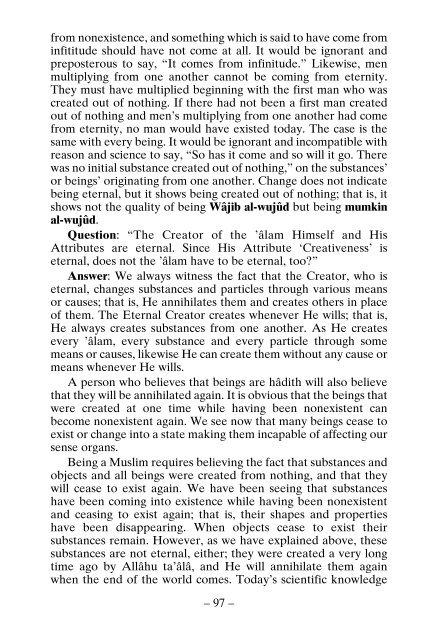Belief and Islam
BELIEF AND ISLAM star This work, Belief and Islam, originally was written in Persian under the title I’tiqâd-nâma by Hadrât Mawlânâ Khâlid al-Baghdâdî, a profound ‘âlim of Islam and a specialist in ma’ârif of tasawwuf. Hâji Faydullah Effendi of Kemah, a khalîfa of great walî Mavlânâ Mahmûd Sâhib, the brother of the author, translated the book into Turkish and named it Farâid-ul-fawâid which was printed in Istanbul in 1312 A.H.[1894]. Our bookstore had it translated again from the Persian original into Turkish and, some explanations and three chapters, published it with the title Imân ve Islâm in 1966. German, French and Arabic versions are also published by our bookstore. This book, explains five fundamentals of Islam, six fundamentals of îmân and the contemporary information about the matter and refutes those who are against Islam and those who are lâ-madbhabî.
BELIEF AND ISLAM
star This work, Belief and Islam, originally was written in Persian under the title I’tiqâd-nâma by Hadrât Mawlânâ Khâlid al-Baghdâdî, a profound ‘âlim of Islam and a specialist in ma’ârif of tasawwuf. Hâji Faydullah Effendi of Kemah, a khalîfa of great walî Mavlânâ Mahmûd Sâhib, the brother of the author, translated the book into Turkish and named it Farâid-ul-fawâid which was printed in Istanbul in 1312 A.H.[1894]. Our bookstore had it translated again from the Persian original into Turkish and, some explanations and three chapters, published it with the title Imân ve Islâm in 1966. German, French and Arabic versions are also published by our bookstore. This book, explains five fundamentals of Islam, six fundamentals of îmân and the contemporary information about the matter and refutes those who are against Islam and those who are lâ-madbhabî.
Create successful ePaper yourself
Turn your PDF publications into a flip-book with our unique Google optimized e-Paper software.
from nonexistence, <strong>and</strong> something which is said to have come from<br />
infititude should have not come at all. It would be ignorant <strong>and</strong><br />
preposterous to say, “It comes from infinitude.” Likewise, men<br />
multiplying from one another cannot be coming from eternity.<br />
They must have multiplied beginning with the first man who was<br />
created out of nothing. If there had not been a first man created<br />
out of nothing <strong>and</strong> men’s multiplying from one another had come<br />
from eternity, no man would have existed today. The case is the<br />
same with every being. It would be ignorant <strong>and</strong> incompatible with<br />
reason <strong>and</strong> science to say, “So has it come <strong>and</strong> so will it go. There<br />
was no initial substance created out of nothing,” on the substances’<br />
or beings’ originating from one another. Change does not indicate<br />
being eternal, but it shows being created out of nothing; that is, it<br />
shows not the quality of being Wâjib al-wujûd but being mumkin<br />
al-wujûd.<br />
Question: “The Creator of the ’âlam Himself <strong>and</strong> His<br />
Attributes are eternal. Since His Attribute ‘Creativeness’ is<br />
eternal, does not the ’âlam have to be eternal, too?”<br />
Answer: We always witness the fact that the Creator, who is<br />
eternal, changes substances <strong>and</strong> particles through various means<br />
or causes; that is, He annihilates them <strong>and</strong> creates others in place<br />
of them. The Eternal Creator creates whenever He wills; that is,<br />
He always creates substances from one another. As He creates<br />
every ’âlam, every substance <strong>and</strong> every particle through some<br />
means or causes, likewise He can create them without any cause or<br />
means whenever He wills.<br />
A person who believes that beings are hâdith will also believe<br />
that they will be annihilated again. It is obvious that the beings that<br />
were created at one time while having been nonexistent can<br />
become nonexistent again. We see now that many beings cease to<br />
exist or change into a state making them incapable of affecting our<br />
sense organs.<br />
Being a Muslim requires believing the fact that substances <strong>and</strong><br />
objects <strong>and</strong> all beings were created from nothing, <strong>and</strong> that they<br />
will cease to exist again. We have been seeing that substances<br />
have been coming into existence while having been nonexistent<br />
<strong>and</strong> ceasing to exist again; that is, their shapes <strong>and</strong> properties<br />
have been disappearing. When objects cease to exist their<br />
substances remain. However, as we have explained above, these<br />
substances are not eternal, either; they were created a very long<br />
time ago by Allâhu ta’âlâ, <strong>and</strong> He will annihilate them again<br />
when the end of the world comes. Today’s scientific knowledge<br />
– 97 –

















